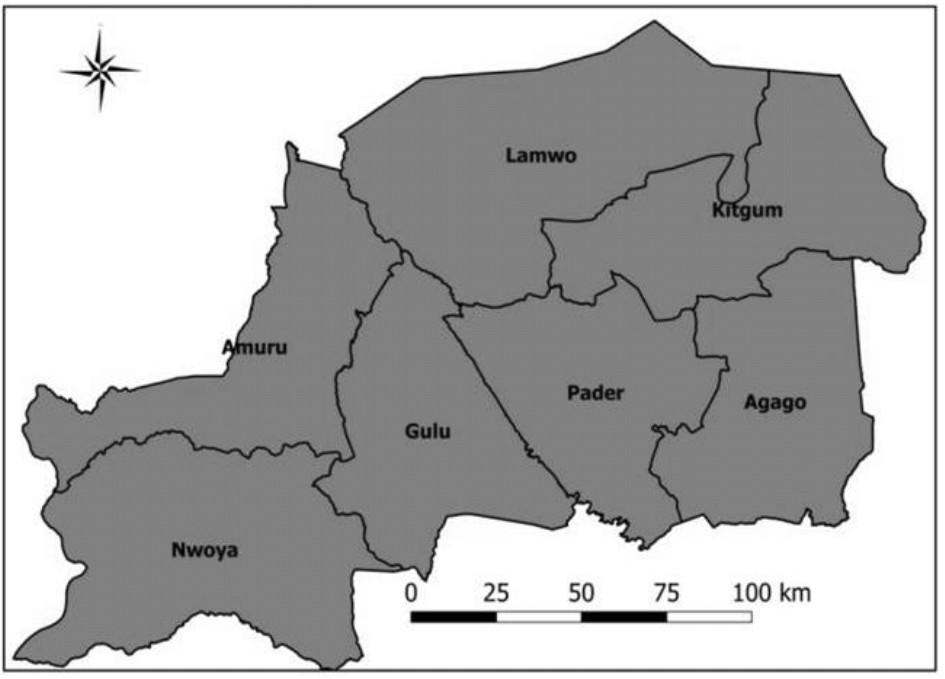By Olak, M. (2025) — Educationist, Political Critic & Researcher
The Acoli sub-region, comprising eight districts—Gulu, Kitgum, Pader, Amuru, Nwoya, Agago, Lamwo, and Omoro—continues to grapple with a deep-rooted leadership crisis. This vacuum is not a recent phenomenon; rather, it is the result of decades of historical, political, social, and economic dynamics.
1. The Legacy of War and Conflict
The Lord’s Resistance Army (LRA) insurgency (1986–2006) left a lasting scar on the Acoli sub-region. The war displaced communities, dismantled traditional leadership structures, and weakened local governance. Many leaders were killed, fled, or compromised. As a result, post-war leadership has largely been transactional characterized by self-enrichment and personal gain rather than service to the people.
This pattern has led to widespread public disillusionment. Elected leaders often prioritize personal interests, and many are easily co-opted by the regime, undermining trust and progress in the region.
2. Weak Political Representation and Fragmentation
Since the end of the insurgency, Acoli has lacked a unified, strong political voice at the national level. Instead of championing regional development, many leaders have pursued narrow political survival. The recent controversy involving Acholi Parliamentary Group Chairperson Hon. Anthony Akol, who led a faction to meet President Museveni with a disputed document, exemplifies this fragmentation. Critics, including MP Fr. Charles Onen, condemned the move as self-serving, further eroding trust among constituents and fellow leaders.
3. Marginalization and State Neglect
Many in Acoli believe that the central government continues to marginalize the region. Poor infrastructure—dilapidated roads, under-resourced schools and hospitals, and a lack of market access—reflects this neglect. Industrial investment is minimal, poverty rates remain high, and national development policies often overlook the specific needs of the region.
4. Erosion of Traditional Leadership
Traditional leaders (Rwodi) once held key roles in governance, conflict resolution, and cultural preservation. However, modernization, political interference, and economic challenges have diminished their influence. Allegations of land grabbing involving Rwot David Onen Achana II, in collaboration with political and government actors, have further discredited traditional institutions, undermining their moral authority in the community.
5. Youth Disillusionment and Absence of Succession Planning
A major contributor to the leadership crisis is the lack of structured mentorship and training for young leaders. Despite the emergence of many aspiring young politicians—such as Hon. Mungu Brian, Hon. Okot Kenneth, Hon. Otim Francis, Hon. Stella Kijange Lajiri, and others—there is no leadership training infrastructure in the entire sub-region to support their growth. Corruption, nepotism, and lack of opportunities discourage broader youth participation in governance.
6. Economic Struggles and Unemployment
High unemployment and economic hardship force people to focus on survival rather than civic engagement. Without robust programs for industrialization, agriculture, or entrepreneurship, many youth rely on handouts, aid, or patronage. General Otema’s activities in Gulu City show the potential for change, but similar initiatives remain limited across the region.
7. Political Interference and Divide-and-Rule Tactics
The central government has, at times, exploited divisions within Acoli to weaken collective bargaining power. Political parties often inflame factionalism, making it difficult for strong, independent regional leaders to emerge. Divide-and-rule tactics have splintered Acoli’s voice in national discourse.
How to Address the Leadership Vacuum in Acoli
Solving this crisis requires deliberate, multi-pronged efforts that combine political will, community mobilization, economic empowerment, and cultural revitalization.
1. Foster Political Unity and Strong Representation
-
Encourage collaboration across political divides.
-
Establish regional forums to unify voices on Acoli’s national interests.
-
Elect leaders with integrity, vision, and a commitment to the people.
2. Revitalize Traditional Leadership
-
Rebuild respect and independence for cultural institutions.
-
Reinforce their roles in conflict resolution and civic mobilization.
-
Shield traditional leaders from partisan politics.
3. Empower Youth and Build Future Leadership
-
Establish mentorship programs and leadership training centers.
-
Promote youth participation in politics, civil society, and enterprise.
-
Invest in education and skills development.
4. Drive Economic Development
-
Attract investment to create jobs and reduce dependency on aid.
-
Promote agribusiness, tourism, and light industries.
-
Ensure fair distribution of national resources for infrastructure, education, and health.
5. Increase Civic Awareness and Community Mobilization
-
Conduct civic education programs to foster informed political participation.
-
Strengthen local civil society organizations to hold leaders accountable.
-
Encourage grassroots involvement in governance.
6. Counter Political Manipulation
-
Promote reconciliation among leaders and communities.
-
Resist external divide-and-rule strategies.
-
Advocate for inclusive national policies and fair representation.
Conclusion
The leadership crisis in Acoli is complex, stemming from historical trauma, political disunity, economic stagnation, and weakened cultural institutions. But it is not insurmountable. By embracing unity, nurturing youth leadership, empowering communities, and rebuilding institutional trust, the Acoli sub-region can chart a new path toward progress and self-determination.
The responsibility lies with all stakeholders—leaders, elders, youth, and citizens—to rise above division and collectively rebuild Acoli.


One Response
An ambitious roadmap: but achievable objectives.